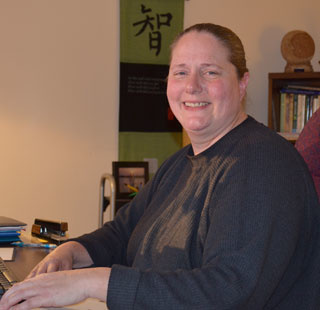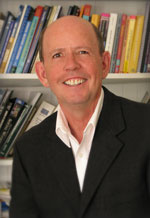Say you’re from Puerto Rico, and your family’s just moved to Iowa for a handful of jobs in the energy industry. You’re settling in okay, except that your son-in-law has been having visions, more of them than usual, and can’t focus at work. A friend suggests the local mental health clinic, and though no one in your family’s ever been to such a place, you’re desperate; you stop by to make an appointment.
But family members, it turns out, cannot make the appointments—they’re not even allowed to join in the sessions. There are no Spanish-speaking counselors, either, and when you try to explain about the visions—the angels your son-in-law sees in the hallways, la Virgen, his late father—you’re met with skeptical eyebrows and words like psychosis. You begin to think maybe he’s better off on his own when you glimpse the little sign on the receptionist’s desk: INSURANCE OR CREDIT CARD ONLY. That settles that; your family has neither.

It’s scenarios like this that University of Iowa alumna Meg Bessman-Quintero, a Licensed Independent Social Worker (LISW)—the only bilingual, master's-level mental health therapist practicing in the Sioux City area—works hard to avoid.
At Catholic Charities in Sioux City, Iowa, where she counsels primarily Spanish-speaking immigrants and their families, clients can use cash to pay the sliding-scale fee—as little as seven dollars per session; bring their families into the counseling room with them; and, most importantly, discuss their concerns, symptoms, and treatment plans in their native language (which, research shows, makes the therapy twice as effective).
Every new client is welcomed in Spanish: “Good morning, I’m Meg, the therapist. Are you ready to start? Will your family be waiting here for you or were you hoping they could join us? Is it all right if we use tú” (a more familiar form of Spanish)?"
Meeting local needs thanks to MSW satellite program
Bessman-Quintero, a 2005 graduate of the UI’s Master of Social Work (MSW) satellite program in Sioux City, decided to pursue an MSW after working for several local social service agencies and noticing that Hispanic clients who were struggling with unemployment, financial insecurity, mental illness, substance abuse, and domestic violence “often came from cultural contexts that were not congruent with the therapy they were getting. There’s an old African proverb: we see the world from where we stand. You can become very disoriented when you live and work in a system that doesn’t function how you learned it.”
Wanting to better serve the area’s growing Latino population and knowing that mental health counseling required a master’s degree, Bessman-Quintero enrolled in the Sioux City MSW program, one of three part-time, distance education MSW programs offered by the UI’s renowned School of Social Work in cooperation with the UI Division of Continuing Education, Center for Credit Programs.
There, Bessman-Quintero—and her cohort of 30-some students from across the tri-state region—took a wide range of courses in social work theory and practice, studying human behavior, psychopathology, social welfare policy, research methods, ethics in social work practice, and grant-writing, among other subjects.
While the program didn’t specifically teach culturally relevant mental health interventions, Bessman-Quintero says, “It was a great program in that it was flexible enough for me to explore the differences between my own cultural perspective and that of my potential clients. The instructors worked with me and let me be creative so I could learn about the population I was interested in serving,” even allowing her to do her 30-day foundation practicum in Mexico.

When it comes to satellite MSW programs, “We’re the only shop in town,” says Ed Saunders, director of the School of Social Work in the College of Liberal Arts and Sciences. “And we have been for 45 years.”
Other Iowa universities offer MSW programs, but no other college in the state offers the distance-education variety. Saunders says the school established them to fill an ongoing need for professional social workers in specific areas of the state.
“The MSW is a key credential,” says Saunders. Not only can master’s-level social workers provide much-needed mental health counseling, but, according to federal law, they can also bill insurance companies for their services, while bachelors-level social workers cannot. For this reason, he says, “Agencies are loving the programs. Their economic viability and stability is dependent on having advanced professionals.”
Working full-time, studying part-time
The UI’s other part-time MSW programs are located in Des Moines and Davenport. All are fully accredited by the Council on Social Work Education, offer concentrations in both family-centered and integrated (i.e., community) practice, take about three years to complete (two and a half if you already have a bachelor’s in social work), and employ faculty who teach courses both on-site at local host colleges and via teleconference. Many of the programs’ adjunct instructors are experienced social workers in the community—like, well, Bessman-Quintero, who now teaches a course on family violence for the MSW program.
The most unique aspect of these programs, though, is that almost all of the classes are held in the evenings and on weekends to accommodate nontraditional students (those over 25 and returning to school) and those working full-time jobs.
As Bessman-Quintero puts it, “You can still be a real person and do your work and be with your family while you study.”
At least 30 percent of students in the Sioux City program are nontraditional, says Saunders, who attributes this figure in part to the recent economic downturn.
“I think people have found it an opportunity, when they have become unemployed or marginally employed, to look around and say, ‘What kind of education would I want for the future? What career would fit?’ A lot of them have an interest in human services and have the spirit of giving back,” Saunders says.
“Some people are naturals,” he adds, recalling his own role model, an aunt with a deep generosity of spirit who took Saunders and his siblings in as children when their parents couldn’t care for them. She was effectively a social worker, he says, as she cared for people across the community, but of course she didn’t get paid to do it.
To help more people—people like his aunt, who are committed to the well-being of others—formally pursue their interest in social work, Saunders is collaborating with the school’s new director of distance education to roll out the school’s full MSW curriculum across the state within the next five years using distance technology.
Not that going back to school is easy: “The temptation is always to quit,” recalls Bessman-Quintero, “because if you’re a parent or if you’re in a marriage, you have all these different obligations, and going to school is a luxury.”
Luckily, Bessman-Quintero says, distance-education students tend to support each other.
“There was quite a bit of camaraderie. Everybody at any given moment was saying, ‘I don’t think I can do this, I’ll stop now and start again later,’ but we pushed each other to stick with it,” Bessman-Quintero says.
A beautiful job market
Despite the programs’ strong enrollments, there are still plenty of social work jobs to be filled.
“The job market is beautiful,” says Saunders. “The social work profession is profiting from the greater recognition by the federal government via the Affordable Care Act of the need to serve disadvantaged populations. People can make a good middle-class living, particularly with a master’s degree, in this field. Our graduates are in the hospitals, they’re in the schools, they’re in the child welfare organizations, they’re in the mental health clinics, in the communities, they’re in positions of leadership within DHS—they’re everywhere.”
For her part, Bessman-Quintero, who recently won the prestigious Sioux City Human Rights Award, looks forward to the day when she’s not the only Spanish-speaking therapist in town, mostly for the sake of the area’s underserved Latino population, but also, she says, for a dash of perspective.
“Only when I have competition, when my clients can pick their therapist, can I consider myself a good therapist,” she says, then adds, laughing, “If they pick me.”
To learn more about the School of Social Work’s MSW programs, visit www.uiowa.edu/~socialwk/. You can find Catholic Charities online at www.cathchar.com/.